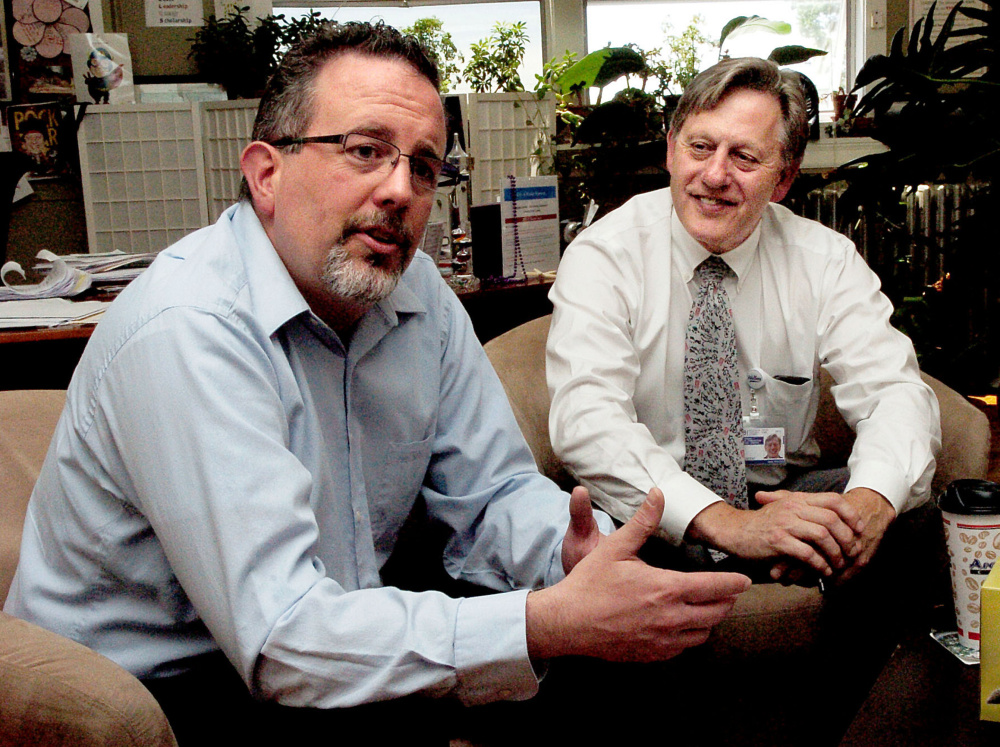Regional School Unit 18 isn’t going to let teachers go it alone.
The Oakland-based district is using a new system to evaluate educators and help them grow professionally. This past school year was the first year of implementation.
The system will set teachers on one of three plans, which determines how many observations they’ll have and how much feedback they’ll get, district officials said.
The increase in consistent feedback is what makes the new system so valuable for teachers, said Mark Hatch, principal of Messalonskee Middle School in Oakland. Hatch was a member of the committee of five administrators and 10 teachers who created the new system.
“You can’t expect anyone to grow if they’re not getting feedback,” Hatch said.
The idea of an overhauled system came about when, in 2009, School Administrative District 47 and China Public Schools consolidated into RSU 18. The district had two of everything, RSU 18 Superintendent Gary Smith said.
Then, the Maine Department of Education created specific requirements for a performance evaluation and growth system for school staff in a new rule, Chapter 180. This was to keep the state in line with the federal No Child Left Behind Act.
It was “fortuitous timing,” Smith said.
The state law presented challenges to the committee. There was language about how to essentially fire teachers if they didn’t perform well after two years.
“That had a lot of bite in there,” Smith said.
Student performance also had to count as 20 percent of a teacher’s evaluation.
“That accountability piece is always difficult,” Hatch said. “It’s not like a factory-type setup where you can expect someone doing a quality job will get X result.”
The committee did try to soften that part of the requirement. The student learning objective, which each teacher sets for themselves each year, is factored into the student performance score. Teachers said that was helpful because it would allow them to focus on important strategies, Hatch said.
“There are always more and higher expectations placed on educators all the time,” Hatch said. “This needed to be doable.”
Under the new system, most teachers will be on the three-year, self-directed plan, which requires annual observations and peer meetings. Any newly hired teachers will be on the two-year monitored growth plan, which requires biannual observations and peer meetings. The directed growth plan, which can last 60 days up to a year, is for teachers who are struggling or need extra guidance. They get more informal observations than those on other plans.
The administrators who conduct the observations will be grading teachers on 41 elements in three main areas using a software program. They talk with students, look for certain elements and write feedback, which gets emailed to the teachers before they leave the room. The teachers can then request a one-on-one meeting if they want to learn more about why they got the score they did.
The three main areas are routine events, like setting rules; addressing content through teaching strategies; and on-the-spot situations, like redirecting students from a sudden distraction.
They are based on the Marzano Learning Map, a research-based framework for teaching from the Marzano Center. This framework gave the committee the language to talk about the project.
There was a lot of talking and not much decision-making for the first year of the system, Hatch said.
“This allowed us to solidify our focus on growth,” he said. The committee decided that the evaluation shouldn’t be as important as consistent feedback and growth for the teachers. The decisions were easier to make after that, Hatch said.
As part of this focus on growth, teachers will create their own “growth plans” each year, picking areas they want to develop and plotting the steps to get there. Administration will approve these goals and look out for any related elements during observations.
The district is also planning to set up peer observations so that teachers can give each other feedback. They are working on training teachers on how to evaluate others.
A bonus of observing more and collecting information in a regimented way is that the district will have comparable data collections now. Administrators can use data to plan development workshops at teachers’ meetings, or work with a teacher in an area where they are consistently struggling.
“We can see things at the macro level, too,” Smith said, and the whole district can plan development workshops or changes to help teachers.
While the state has approved RSU 18’s plan, Smith said it isn’t a finished project yet. Most of the committee members are staying on to adjust and reform the system as needed. The system for evaluating administrators, which will be similar, is going to go into effect next school year.
Before this system, teachers got feedback every three years, which was only “loosely coupled” with their goals, according to Smith.
Now, the system is more comprehensive, he said, which will help teachers grow.
RSU 18’s mission, which is to allow each student to learn at his or her correct pace, “is a monumental task to do as a classroom teacher,” Hatch said. This system lines everything up and provides feedback.
“That means students are going to have the best opportunity to learn,” he said.
Madeline St. Amour – 861-9239
mstamour@centralmaine.com
Twitter: @madelinestamour
Send questions/comments to the editors.




Comments are no longer available on this story